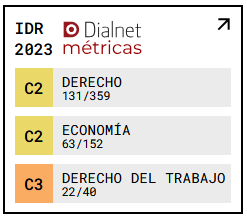The possibility of declaring common diseases as work accidents
DOI:
https://doi.org/10.18172/redsye.6317Keywords:
work accident, occupational illnesses, work related illnesses, presumptionAbstract
For more than 124 years, the legal definition of a work accident and its jurisprudential interpretation have admitted that, in addition to external injuries, strictly speaking, the concept also includes those internal injuries caused by work, which sometimes can manifest suddenly, such as a stroke, but normally they manifest slowly and progressively like most diseases. Furthermore, diseases can have one only cause, that is, have a single cause, but multiple forms of contagion. Such as a virus. In such a way that, if it is proven that work is the cause of the contagion, for example, cleaning staff at a health centre who is pricked with a syringe infected with a virus that has been discarded, said disease will be considered a work accident. On the contrary, in diseases which have various causes, such as a stroke, which may have hereditary, genetic, lifestyle, sedentary, smoking, drinking, diet, etc. causes, or the heart attack occurs at the time and place of work and the presumption of a work accident under art. 156.3 of the LGSS is applied, or the disease ends up being declared as common.
Downloads
References
ALONSO OLEA, M. y TORTUERO PLAZA, J.L., Instituciones de Seguridad Social, Ma¬drid, 1992.
CHACARTEGUI JÁVEGA, C., El concepto de accidente de trabajo: su construcción por la jurisprudencia, Albacete, 2007.
DE LA VILLA GIL, L.E. y DESDENTADO BONETE, A., Manual de Seguridad Social, Pamplona, 1979.
DE LOS REYES BARROSO, M., Las enfermedades del trabajo, Valencia, 2002.
DESDENTADO BONETE, A., Concepto del accidente de trabajo, en AA.VV., Comentario a la Ley General de la Seguridad Social, Granada, 1999.
FERNÁNDEZ AVILÉS, J.A., El accidente de trabajo en el Sistema de Seguridad Social (Su contradictorio proceso de institucionalización jurídica), Barcelona, 2007.
HEVIA CAMPOMANES, E., Los accidentes de trabajo y las enfermedades profesionales, Madrid, 1990.
JURADO SEGOVIA, A., Acoso moral en el trabajo: análisis jurídico–laboral, Madrid, 2008.
JURADO SEGOVIA, A., Enfermedades psicológicas y accidente de trabajo. A propósito de un supuesto de acoso sobre una trabajadora con dolencias previas, Revista Doctrinal Aranzadi, n.º. 44, 2009.
LÓPEZ GANDÍA, J. y AGUDO DÍAZ, J., Nueva regulación de las enfermedades profesio¬nales, Albacete, 2007.
MARTÍNEZ DE VIERGOL. A., Consideración del síndrome de «burn out» como consti¬tutivo de la contingencia profesional del accidente de trabajo origen de la declaración de incapacidad permanente absoluta, Revista Doctrina Aranzadi, n.º. 31, 2005.
MORENO CALIZ, S., La jurisprudencia más reciente en materia de accidentes de trabajo y enfermedades profesionales (1998–1999), TS., n.º 109, 2000.
MUÑOZ RUÍZ, A.B., La realidad inventada. Accidente de trabajo, acoso imaginario y riesgo de simulación, Revista Doctrinal Aranzadi, n.º. 19, 2012.
REMIGIGIA PELLICER, V.D., Infarto y accidente de trabajo, Valencia, 2002.
RODRÍGUEZ–PIÑERO, M., «Las enfermedades del trabajo», RL, Tomo II, 1996.
TORRENTE GARI, S., El trastorno mental como enfermedad común en la protección de la Incapacidad Permanente, Albacete, 2008.












